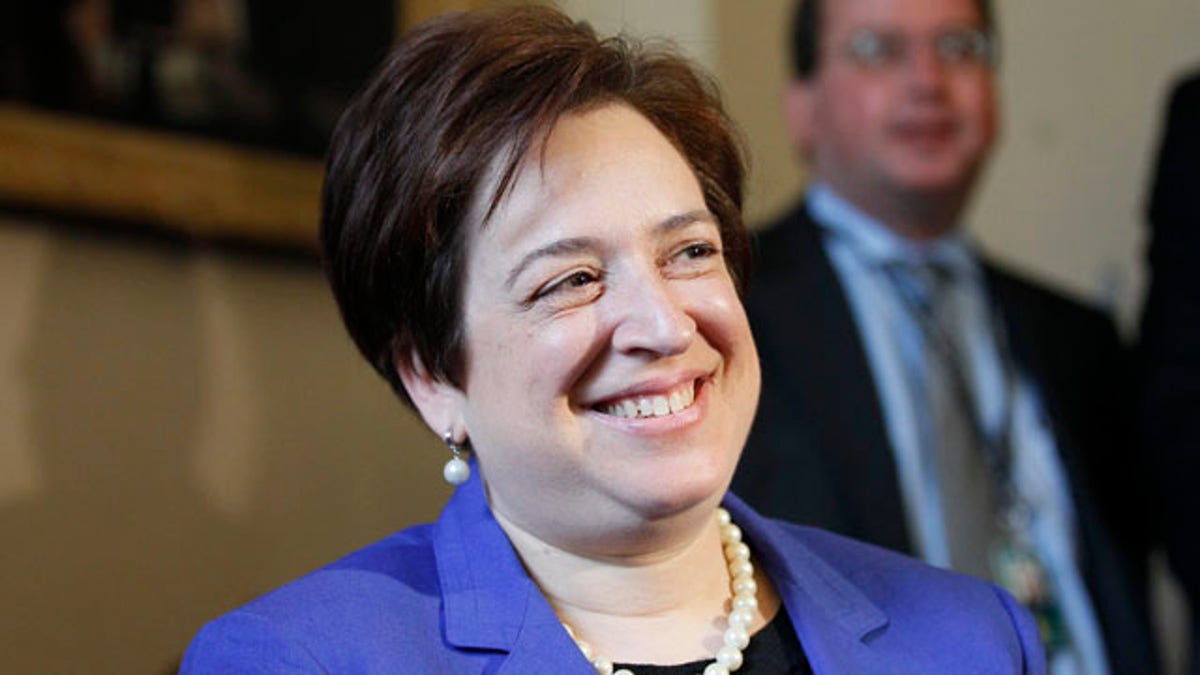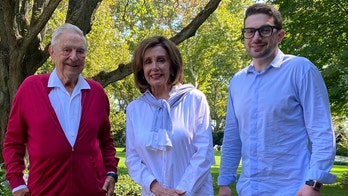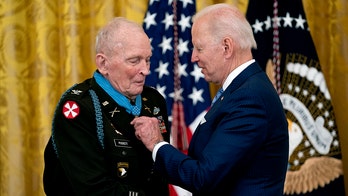
Supreme Court nominee Elena Kagan (AP2010)
With her confirmation hearing less than a week away, Supreme Court nominee Elena Kagan is facing attacks from Republican critics over newly released documents that show she briefly suspended on-campus military recruitment when she was dean of Harvard Law School in 2005.
Democrats say the documents, released over the weekend by the Department of Defense, strengthen support for Kagan by showing that she permitted military recruitment through the Harvard Law School Veterans Association, despite her opposition to the military's "Don't Ask, Don't Tell" policy regarding gay servicemen and women.
But Republicans are using the documents to blast Kagan's "discriminatory treatment of the military" while she was at Harvard.
Alabama Sen. Jeff Sessions, ranking member of the Senate Judiciary Committee, suggested that the White House has perpetuated "misleading and even untrue statements" regarding Kagan's treatment of military recruiters at Harvard.
"The White House had the temerity to declare that these records show that Ms. Kagan worked to 'accommodate military recruiters,' to 'assiduously follow the law,' and 'ensure that Harvard law students could choose a career in military service,' Sessions said in a statement Monday.
"The documents themselves show these statements are false and are part of a campaign to rewrite her history at Harvard," he said.
Kagan was dean of Harvard Law from 2003 to 2009, when she was picked by President Obama to serve as U.S. Solicitor General.
The 850 pages of newly released internal documents include e-mails that show Kagan briefly suspended military recruiters from conducting interviews through the main on-campus career office, a stand the law school took because the military's ban on openly gay people serving in the military violated Harvard's anti-discrimination policy.
A string of correspondence among Defense Department officials in 2005 alleges that Harvard recruitment managers denied access to recruiters in the spring of 2005 because "the faculty and administration have not yet decided whether to allow military recruiting at the law school." The DOD documents also allege that Mark Weber, assistant dean for career services, could not assure the military's participation in the recruitment program for the following fall semester.
One internal department e-mail, dated Feb. 20, 2005, stated that "Harvard Law School is delaying and providing a 'slow role' to Air Force's efforts to recruit during the spring recruiting season."
Another department e-mail, sent March 2, 2005, claimed that the Army was "stonewalled" at Harvard.
"Phone calls and e-mails went unanswered and the standard response was -- we're waiting to hear from our higher authority," the e-mail read.
The Army's frustration with Harvard culminated with a letter sent to then-president Lawrence Summers on May 11, 2005, in which the Department of the Air Force threatened to withhold millions of federal dollars from Harvard if the university failed to allow recruitment access.
"The Harvard Law School's 'Spring 2005 On-Campus Interview Program' ended on March 4, 2005, without military recruiters allowed access to campus and students in a manner that is equal in quality and scope with other employers," the letter read.
"Should it be determined that Harvard University, as an institution of higher education…is in violation of the aforementioned statutes and regulations, such funding would be stopped," it continued.
The school eventually granted the military access in Sept. 2005. And the Supreme Court issued a ruling later that year that forced Harvard and other schools to either assist the military or give up millions in federal funds.
Kagan announced the decision to students and faculty in an e-mail, saying the school will "provide Career Services assistance to the military, as the school does to nondiscriminating employers," according to the Crimson school newspaper.
Still, she wrote that "Many members of the Harvard Law School community will accept the Court's invitation to express their views clearly and forcefully regarding the military's discriminatory employment policy."
Kagan's resistance to the military's presence on campus highlighted an already fierce debate over the military's "Don't Ask, Don't Tell" policy, which the House and Senate Armed Services Committee voted to repeal in May. And it also will be used as fodder for Republicans looking to block her appointment to the nation's highest court.
The White House had defended Kagan's record by saying that the military recruiters were never denied access to students.
"Military recruiters were never barred from the campus," White House Press Secretary Robert Gibbs said in a May 17 news conference.
"They were not afforded access to the office of career services, but had access to students through the veterans organization," he said. "Military recruitment for the semester that is being looked at actually increased from the prior semesters."
Following the documents' release, deputy White House press secretary Bill Burton said Kagan "was in fact following the rules of the campus."
"As a lot of you already know, while she was at Harvard, military recruitment either stayed the same or went up every single year that she was there," Burton told reporters. "She has the support of many of the young men and women who went through ROTC while they were there at school."
But Sessions has noted that the veterans organization expressed in a letter to the law school that it lacked the resources to take the place of the campus office.
"Given our tiny membership, meager budget, and lack of any office space, we possess neither the time nor the resources to routinely schedule campus rooms or advertise extensively for outside organizations, as is the norm for most recruiting events," the letter read.




